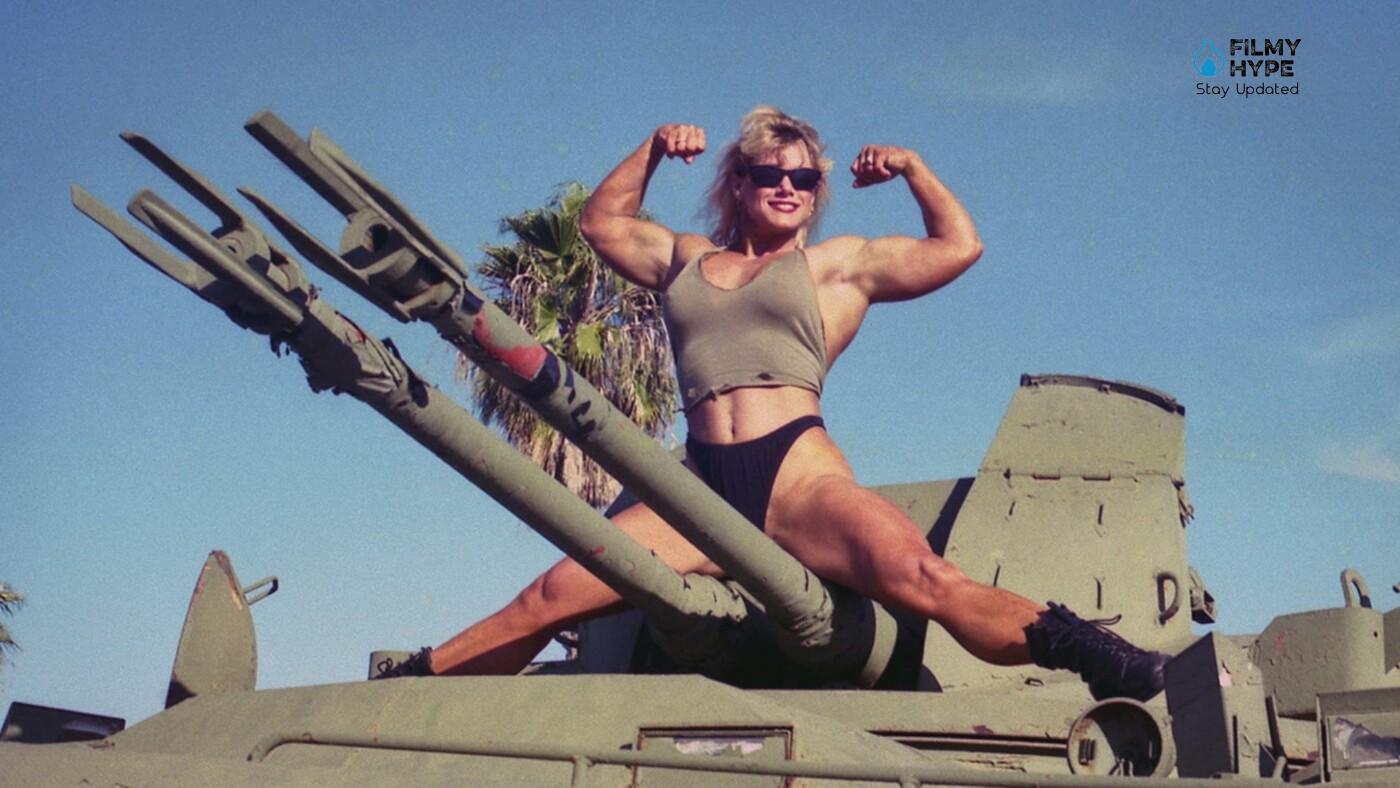Killer Sally Review: Angry Women and Unconventional Victims on Netflix Miniseries
Stars: Peggy Hook, John McNeil, Sally McNeil
Director: Nanette Burstein
Streaming Platform: Netflix
Filmyhype.com Ratings: 3/5 (three stars)
The photo accompanying the title Killer Sally, a true crime in three episodes available on Netflix from November 3, 2022, was not chosen by chance. It portrays the protagonist Sally McNeil, a bodybuilder accused of the murder of her husband Ray and sentenced to 25 years in prison, sitting on a tank in skimpy tops and panties in one of the classic bodybuilders poses that show off her biceps sculpted by years of push-ups. and exhausting hours in the gym. In that same photo shoot dating back to the early 90s, there is an image, or rather an amateur video, in which the former Marine herself holds a rifle with a lot of ammunition around her neck in favor of the camera.

A VHS brought to court in the February 1996 trial which, in the announced defeat of his defense lawyer, ruled the verdict of voluntary murder without the excuse of domestic violence. That weapon displayed with bravado was decisive: hit with two rifle shots in the face on the night of Valentine’s Day in 1995, McNeil’s athlete and husband died a few hours after her transport to the hospital. Their marriage lasted about ten years and was punctuated by mutual violence, driven by her jealousy and by the desire to control him, all in the hyper-macho environment of American bodybuilding that Nanette Burstein’s documentary tells us Well.
Killer Sally Review: The Story Plot
Killer Sally tells the story of the most famous crime in the world of bodybuilding. On Valentine’s Day 1995, national bodybuilding champion Ray McNeil was choking on his wife Sally (also a bodybuilder), who grabbed a gun and fired two lethal shots at him. Based on the documented history of domestic abuse, Sally claimed she acted in self-defence, making a sudden decision to save her life. For the prosecutors, it was premeditated murder, the revenge of a jealous and aggressive wife. She was called “delinquent”, “bulla” and “monster”. The media described her as a “beefy wife” and a “gym princess.” Sally she says she spent her life trying to survive, trapped in a cycle of violence that began in childhood and ended with Ray’s death. This complex true crime story examines domestic violence, gender roles and the world of bodybuilding.
Divided into three chapters of fifty minutes each, Killer Sally reveals through archival material and exceptional talking heads including the 60-year-old protagonist herself, a subculture of extreme training still not fully known and very often repulsive, made its debut in the 70s thanks to Schwarzenegger and exploded the following decade with the fitness revolution. From powerlifting competitions to amateur shots of newborn wrestling, up to the so-called “schmoe” perversion, men who paid the athletes to be ‘beaten’ and therefore feel pleasure, the first part brings out an excessive world, brought to the limits of fatigue, disciplined from the diet (114 eggs per week) and were steroids and doping begin to run undisturbed: anabolic substances procured under the counter from Mexico or in the circuits of gyms, taken in quantities to improve performance, although they masculinized women more and more similar in traits to male colleagues.
Killer Sally Review and Analysis
Behind all that exasperated muscle performativity, and that super 80s gym class look, the love story between Sally and Ray proceeded in the repetitive and toxic cycle of violence, culminating in that episode that changed the life of the woman and his two sons. But it is at the moment of the trial, and therefore the media hype of a victim-Hulk so different from traditional canons, that Burstein’s work questions how McNeil was represented by the news, always in search of the aberrant and media phenomenon of unconventional abused and how his virile and militarized aspect was indestructible in the decision of the popular jury. “Angry women” as they were called by the tabloids, Sally’s case exploded in the same years as Tonya Harding and Lorena Bobbit, representations of a female never resigned and never martyrs, but ‘monsters’ capable of gestures commonly belonging to the male and that society, at the time as perhaps still today, does not forgive.
With Killer Sally, therefore, Netflix’s ambition to compose the infinite mosaic of true crime and news stories to which it is worth dwelling adds a rather interesting piece, precisely because the attraction-repulsion of the world of bodybuilding makes it leads to a very up-to-date investigation into gender-based violence and its narrative methods, not focusing only on the superhumanity of those beefy and surprising bodies but trying to understand how those same bodies convey precise messages to society. Netflix has chosen to focus on a slightly forgotten but very fascinating news story, went to interview a woman who after over twenty years locked up in prison has found her freedom again, she put the facts in front of the public to allow him to analyze, with his own eyes and his mind, who, according to him, was guilty or innocent and told of a world that is not very popular but from which, if lived healthily, there is so much to learn.
This impression is confirmed in the second episode, but it seems more like a deliberate tactic used by director Nanette Burstein to also let the other side present their arguments. In addition to Sally McNeil and her now adult children, the couple’s friends, her former lawyer, the then district attorney and television reporters of the time also have their say. In particular, the public prosecutor explains very convincingly why it was murder. Burstein’s intention, however, seems to be not to attach too much importance to the whole thing. His testimony appears to have been included pro forma, as the documentary does everything it can to portray Sally as a poor victim who, like so many women, has just been treated unfairly by the judiciary. Killer Sally does a good job of showing that she was prejudiced by the media, which she is, but at the same time portrays it as if something like this only happens to women, who would therefore automatically be innocent.
However, Killer Sally does not shy away from pointing out the negative sides of the bodybuilder. We learn from her children that she was violent. As we progress, we get more information about Sally’s past, letting us know that she was born into a vicious cycle that few can break out of. Many will miss this, just as many will be lulled into the miniseries and let it speak for itself. This is also due to a sympathetic McNeil, who after her release reminisces about the time and seems to be at peace with herself. Despite everything, the documentary is worth seeing. It just needs to be looked at very carefully.
Killer Sally Review: The Last Words
Killer Sally is one of those series that those who love the world of the gym, those who love to train and always push their limits must see, it is a series that those who have a strong competitive spirit inside and appreciate and understand why some people come to dedicate a life in this sport cannot fail to look also to realize that, at times, imposing limits is necessary in order not to fall victim to one’s actions, as happened to Sally McNeil, the protagonist of the series.







